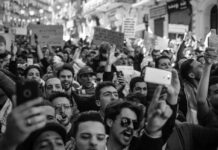Misinformation Follows House Approval of H.R. 1
When Democrats recovered control of the home in January, they introduced H.R. 1 — a bill number designated to indicate the importance of this legislation, which is intended to fight political corruption and increase voter participation. The bill, called For the People Act, keeps a campaign pledge in the midterm election.
The invoice passed the House along party lines on March 8, but it is not likely to move forward. Senate Majority Leader Mitch McConnell has stated the Republican-controlled room wouldn’t take it up.
Where falsehoods and distortions about the bill have spread the measure has generated confusion among networking consumers and readers.
“HR1 passed. Allowing illegal immigrants (foreigners) to vote,” a favorite Facebook article asserts.
The detailed bill, which would create numerous changes to election laws, does not do that.
One of the many things the bill would do, if it were to become law: make Election Day a national holiday; require countries to automatically register eligible voters; induce states to make independent commissions to oversee redistricting; implement campaign-finance and election-security modifications, and need presidential and vice-presidential candidates to discharge 10 years of tax returns. Trump in 2016 broke with the convention of previous presidential candidates by not releasing his tax returns.
The confusion regarding noncitizens comes out of using a legislative maneuver, called a motion to recommit, that represented the last chance for the Republicans to amend the bill before it was passed.
On March 8, the same day the House cast its final vote on the invoice, Texas Republican Rep. Dan Crenshaw introduced a Motion to Recommit H.R. 1 to the Judiciary Committee with instructions to add language condemning voting by”illegal immigrants.”
However, the “sense of Congress” provisions, like the one provided by Crenshaw, have”no force of law,” as explained in a Congressional Research Service report.
“A’ssense of’ resolution isn’t legally binding because it’s not presented to the President for his signature,” the CRS report said. “Even if a’ssense of’ provision is integrated into a bill that becomes law, such provisions merely express the opinion of Congress or the appropriate chamber. They’ve no formal impact on public policy and have no force of law.”
Federal law explicitly prohibits noncitizens from voting in national elections, and no nation has permitted it since the 1920s.
The vast majority of House Democrats voted against Crenshaw’s movement, as did one Republican, Rep. Justin Amash of Michigan.
Crenshaw, whilst talking on the floor of the home, invoked San Francisco as an example of noncitizens voting: “The city of San Francisco has effectively canceled out the votes of its own citizens and replaced it with illegals’.”

But he neglected to define that noncitizens in San Francisco have the right. (The movement he suggested, however, makes that clear.) As we have composed before, the town allows noncitizens, including those in the nation illegally, to vote in school board elections if they’re the parent or guardian of a pupil.
Learn More: Citizenship the Census and Obama
A total of 12 jurisdictions across the country allow noncitizen residents to vote in certain regional elections regardless of legal status, based on Ron Hayduk, a professor of political science at San Francisco State University who studies immigrant voting and contains advocated allowing noncitizens to vote. Those authorities include San Francisco (for school board elections), Chicago (for local school council elections), and 10 cities in Maryland where non-citizens can vote in local races.
And, since we have composed previously, specialists state voter fraud by noncitizens is infrequent, in part due to the consequences, which could include deportation.
Despite the fact that Crenshaw’s movement would have had no coverage effect if accepted, Democrats’ rejection of it became the subject of headlines like this one in the Washington Times: “House votes in favor of illegal immigrant voting”
A site is known for distributing false information, News Punch — previously called Your News Wire — carried a similar headline and started with the deceptive claim that”House Democrats voted Friday to allow illegal immigrants to vote in American elections — turning their back to the U.S. Constitution.”
Similarly, Republican Rep. Steve Scalise of Louisiana advised colleagues on March 12 that”last week, we had laws on the floor to stop people which are here illegally from voting. And you saw Democrats vote against that. Essentially, voting to allow people here to vote in elections and to use taxpayer funds to assist people here to vote.”
Again, that is misleading: there was no vote to give the right to immigrants in the country, and The movement would have had no influence on the legislation. Voting by noncitizens is illegal in almost all elections, in addition to elections — save for a few exceptions on the level. This was the case both before and following the House’s acceptance of H.R. 1.
Facts Check: Uber Fake










